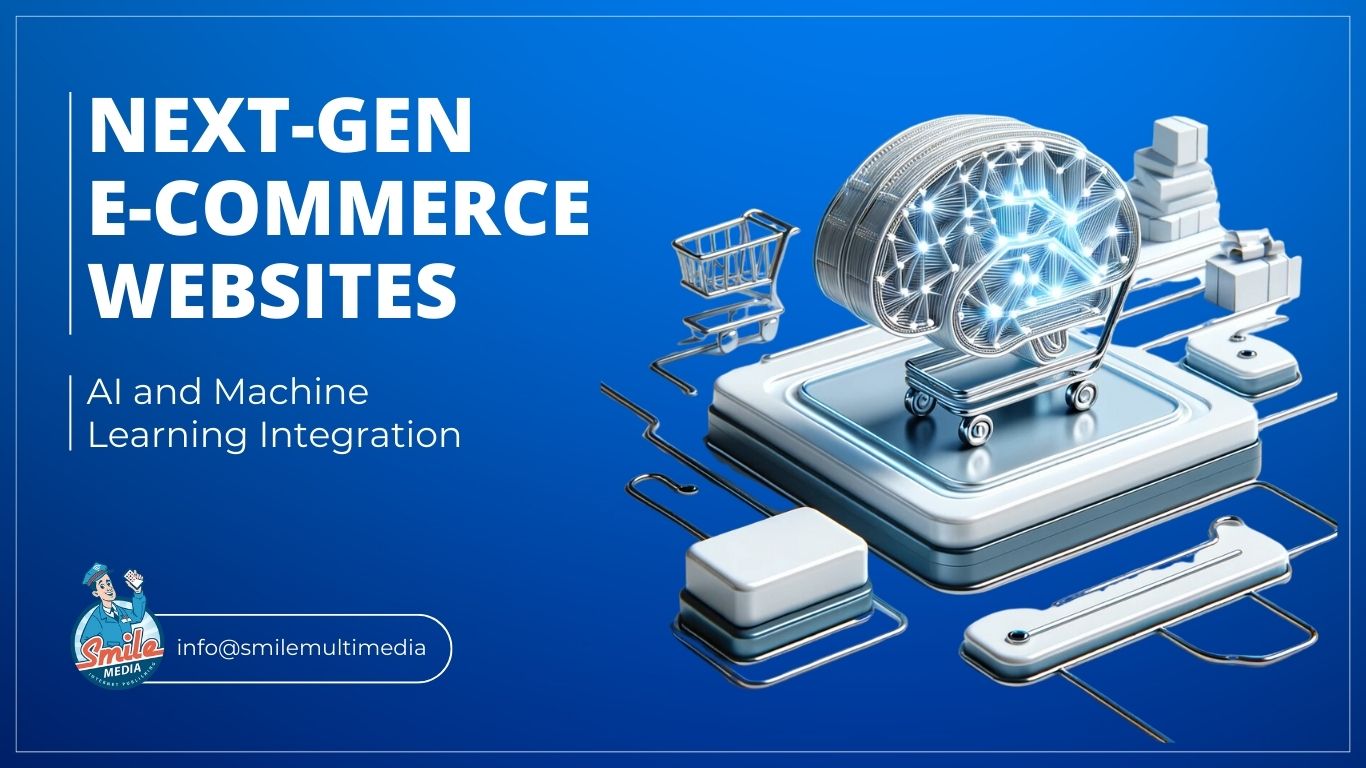Welcome to the future of e-commerce, where Artificial Intelligence (AI) and Machine Learning (ML) are not just buzzwords but essential tools for success. At Smile MEDIA, we specialize in AI for e-commerce websites, recognizing the transformative impact of these technologies on the e-commerce landscape. This guide is designed to help you navigate the integration of AI and ML into your e-commerce platforms, ensuring you stay ahead in the competitive digital marketplace.
The Evolution of E-commerce with AI and Machine Learning
E-commerce has evolved dramatically over the years, and the integration of AI and Machine Learning in e-commerce marks a significant milestone in this journey. These technologies have revolutionized how businesses interact with customers, process data, and manage operations. From the early days of online shopping to the current era of intelligent automation, AI in e-commerce and machine learning in e-commerce have been instrumental in shaping the industry. Key statistics and trends highlight their profound impact, demonstrating how businesses leveraging these technologies are achieving remarkable growth and efficiency.
Milestones in E-commerce Evolution
The journey from simple online catalogs to sophisticated AI-driven platforms reflects the dynamic evolution of e-commerce. Several key milestones have marked this transformation:
- The Rise of Online Marketplaces: The early 2000s saw online marketplaces emerge, changing how consumers shop.
- Mobile Commerce: The proliferation of smartphones brought e-commerce to our fingertips, making shopping more accessible.
- Personalization and Recommendation Engines: E-commerce platforms began offering personalized shopping experiences by leveraging user data.
- AI-Driven Automation: Today, AI and ML are automating various aspects of e-commerce, from inventory management to customer service.
Understanding AI and Machine Learning in E-commerce
AI and ML, while often used interchangeably, serve distinct yet complementary roles in e-commerce. AI involves creating machines capable of performing tasks that typically require human intelligence, such as understanding natural language and recognizing patterns. ML, a subset of AI, focuses on developing algorithms that learn from and make predictions based on data. In the e-commerce context, these technologies work together to create smarter, more responsive platforms that cater to the dynamic needs of businesses and consumers alike.
AI and ML in Action: Real-World Examples
- Chatbots and Virtual Assistants: AI-powered chatbots provide instant customer support, handle inquiries, and guide users through their shopping journey.
- Predictive Analytics for Inventory Management: ML algorithms predict demand trends, helping businesses optimize their inventory.
- Dynamic Pricing Models: AI systems analyze market data to adjust prices in real-time, maximizing profits and competitiveness.
The Role of AI in E-commerce
AI is a game-changer in the e-commerce sector. It powers advanced chatbots that provide seamless customer service, offer personalized product recommendations based on customer behavior, and enable targeted marketing strategies. Successful AI integration in leading e-commerce platforms showcases its potential to transform online shopping experiences, making them more intuitive, efficient, and customer-centric.
Enhancing the Customer Journey with AI
- Personalized Recommendations: AI analyzes past behavior to suggest products, increasing the likelihood of purchase.
- Visual Search Capabilities: AI enables customers to search for products using images, enhancing the user experience.
- AI-Driven Marketing: Tailored marketing campaigns based on AI analysis lead to higher engagement and conversion rates.
Machine Learning's Impact on E-commerce
ML elevates e-commerce to new heights. It plays a critical role in predictive analytics, customer segmentation, and inventory management. Through real-world case studies, we see how ML is transforming e-commerce businesses, making them more agile and attuned to customer needs and market trends.
Examples of ML-Driven E-commerce Success
- Amazon’s Anticipatory Shipping Model: Amazon uses ML to predict what products customers will buy and pre-positions inventory accordingly.
- Netflix’s Recommendation Engine: Netflix's ML algorithms analyze viewing patterns to recommend shows and movies, keeping users engaged.
- Zara’s Fast Fashion Model: Zara uses ML to analyze fashion trends and customer preferences, enabling rapid production and turnover.
Implementing AI and Machine Learning in Your E-commerce Strategy
The integration of AI and ML into your e-commerce strategy is a journey that requires careful planning and execution. It begins with a clear understanding of your platform's specific needs and objectives. Selecting the right algorithms and ensuring high-quality data for training are crucial steps. The key to success lies in starting with small, manageable implementations and scaling up as you gain more insights and confidence.
Steps for Successful Implementation
- Identify Business Objectives: Clearly define what you want to achieve with AI and ML - be it improving customer experience, increasing sales, or streamlining operations.
- Data Collection and Analysis: Gather and analyze data to understand customer behavior and market trends. This data will be the foundation for your AI and ML models.
- Choose the Right Tools and Partners: If necessary, select the appropriate AI and ML tools and partner with technology providers who can offer expertise and support.
Overcoming Challenges in Integration
Integrating AI and ML into e-commerce platforms comes with its set of challenges. Data privacy, the complexity of algorithms, and the need for continuous adaptation are some of the hurdles businesses may face. However, with a strategic approach and the right set of tools, these challenges can be effectively managed, paving the way for a seamless integration process.
Navigating Common Integration Challenges
- Data Privacy and Security: Implement robust data protection measures to ensure customer trust and compliance with regulations. As e-commerce platforms collect and process vast amounts of personal data, it's crucial to safeguard this information to maintain customer confidence and adhere to privacy laws.
- Algorithm Complexity: Invest in training for your team to effectively understand and manage AI and ML systems. The complexity of these algorithms requires specialized knowledge, making it essential for teams to be well-versed in the latest technological advancements.
- Adapting to Market Changes: Continuously monitor and update your AI and ML models to stay relevant in the rapidly evolving e-commerce landscape. The digital market is dynamic, with consumer preferences and trends changing swiftly, necessitating agile and adaptable AI and ML strategies.
- Integration with Existing Systems: Seamlessly integrating AI and ML technologies with existing e-commerce platforms can be challenging. It requires careful planning and execution to ensure that new and legacy systems work in harmony without disrupting the current operations.
- Cost Management: Implementing AI and ML solutions often involves significant investment in terms of both time and resources. Businesses need to strategically plan their budgets to cover the costs of development, deployment, and ongoing maintenance of these advanced technologies.
Enhancing Customer Experience with AI and Machine Learning
AI and ML significantly enhance the online shopping experience. They enable personalized shopping journeys, improve customer satisfaction, and foster loyalty. AI-driven personalization tailors product recommendations and marketing efforts to individual customer preferences, leading to higher engagement and conversion rates. ML offers deep insights into customer behaviors and preferences, which are invaluable for targeting and retaining customers.
Creating a Memorable Shopping Experience
AI significantly enhances the e-commerce user experience by creating a seamless user interface. This advancement makes the interface more intuitive and user-friendly, simplifying and enriching the shopping process for customers. The improved usability facilitated by AI engages users and streamlines their online journey.
In parallel, ML algorithms are employed to analyze customer feedback, playing a vital role in refining product offerings and services. Post-purchase, AI tools engage with customers to provide support and recommendations, fostering repeat business. This approach improves customer satisfaction and builds a loyal customer base, enhancing the overall shopping experience.
AI-Driven Personalization
AI-driven personalization is about creating a shopping experience that feels personal and intuitive for each customer. It involves understanding and catering to the unique preferences of each shopper, leading to higher engagement and conversion rates. This approach enhances the customer experience and drives business growth by fostering customer loyalty and repeat purchases.
Personalization Techniques and Benefits
- Behavioral Targeting: AI analyzes browsing and purchase history to target customers with relevant products.
- Dynamic Content Display: AI customizes the content displayed to each user, based on their interests and past interactions.
- Email Marketing Personalization: AI-driven email campaigns ensure that customers receive relevant and timely information, increasing open and click-through rates.
Machine Learning for Customer Insights
ML provides valuable insights into customer behaviors and preferences, which are crucial for effective targeting and retention strategies. These insights help businesses understand what their customers want, enabling them to tailor their offerings and marketing efforts effectively. By leveraging ML, businesses can improve their targeting accuracy, enhance customer engagement, and ultimately drive higher sales.
Leveraging ML for Deeper Customer Understanding
- Segmentation and Targeting: ML segments customers based on various criteria, allowing for more effective targeting.
- Predictive Analytics: ML predicts future customer behavior, helping businesses anticipate needs and preferences.
- Customer Lifetime Value Prediction: ML models estimate the lifetime value of customers, guiding businesses in resource allocation and marketing strategies.
The Future of E-commerce: AI and Machine Learning Trends
The future of e-commerce with AI and ML is incredibly promising. Emerging technologies like augmented reality and voice assistants are set to redefine the shopping experience further. Staying abreast of these trends is crucial for businesses looking to maintain a competitive edge in the ever-evolving digital marketplace.
Upcoming Trends in AI and ML for E-commerce
- Augmented Reality (AR) Shopping: AR integrates with AI to provide immersive shopping experiences, allowing customers to visualize products in real-world settings.
- Voice-Activated Shopping: Voice assistants powered by AI are making shopping more convenient, enabling hands-free product searches and purchases.
- AI-Enabled Supply Chain Optimization: AI and ML are revolutionizing supply chain management, predicting demand, and optimizing logistics for faster delivery.
Conclusion
AI and ML are not just the future of e-commerce; they are its present. Businesses that embrace these technologies, such as AI e-commerce platforms and AI tools for e-commerce, are poised for success in an increasingly digital world. At Smile MEDIA, we're committed to helping you leverage these technologies to transform your e-commerce platform and achieve unparalleled growth and efficiency.
FAQs:
How can AI improve my e-commerce website?
AI enhances your website by offering personalized shopping experiences, efficient customer service through chatbots, and insightful analytics for better decision-making. It helps understand customer preferences and tailor your offerings to meet their needs.
Is Machine Learning essential for my e-commerce platform?
Absolutely! ML is crucial for understanding customer behavior, predicting market trends, and managing inventory effectively. It helps in making data-driven decisions that are key to the success of any e-commerce platform.
Can AI and Machine Learning integration be cost-effective?
Yes, while the initial investment might seem significant, the long-term benefits in terms of increased sales, customer satisfaction, and operational efficiency make it a cost-effective solution for your e-commerce business.
How does AI impact the customer shopping experience?
AI significantly transforms the shopping experience by providing personalized product recommendations, enabling easier product discovery through visual and voice search, and offering real-time customer support. These enhancements lead to a more engaging and satisfying shopping journey for customers.










